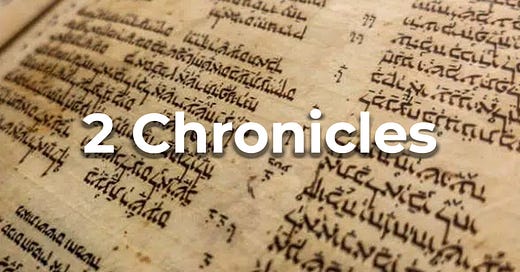The TL;DR Bible: 2 Chronicles
The reverberations of choosing—or refusing—God with your whole heart.
TL;DR: 2 Chronicles reveals the spiritual rise and fall of Judah’s leaders, reminding us that the heart of leadership and the life of the people must be tethered to God, because without Him, strength falters and purpose fades. But with Him comes renewal, peace, and flourishing.
What's the Book of 2 Chronicles About?
2 Chronicles continues the story that began in 1 Chronicles, zooming in on the kings of Judah from Solomon to the exile. Unlike 1 and 2 Kings, which covers both the northern and southern kingdoms, 2 Chronicles narrows the lens to focus on the line of David and the centrality of the temple in Jerusalem.
But this book isn't just a royal historical timeline; it's an extended spiritual meditation. At the heart of the book is a question: what does it mean to seek God? Some kings seek Him with humility and courage, and the nation flourishes (2 Chronicles 17:3-6). Others turn away, and things unravel, sometimes spectacularly (2 Chronicles 28:1-4). The story moves from the heights of Solomon's dedication of the temple to the devastating moment when that same temple is torn down and the people are exiled to Babylon.
Despite everything, the final verses breathe hope. A foreign king allows God's people to return and rebuild (2 Chronicles 36:22-23). Even in spiritual collapse, God does not abandon His promises or His people. The door to restoration remains open.
Why Should You Care?
2 Chronicles was written to a community trying to rebuild after exile: spiritually, emotionally, and communally. It was meant to stir memory and inspire faithfulness. It asked them to look back in order to move forward, to remember what happens when people genuinely seek God, and what happens when they don't.
That same call reaches us today. In a culture offering endless opportunities for spiritual distraction and drift, 2 Chronicles reminds the reader that spiritual health isn't automatic. It has to be chosen. Cultivated. Guarded.
This book also reminds us that real change doesn’t begin with human strategies or systems, but with seeking God. Not in a way that checks a religious box, but a deep reorientation of the heart, soul, mind, and strength toward the living God.
2 Chronicles is a call to return—not just to God's house, but to God Himself.
“If my people, who are called by my name, will humble themselves and pray and seek my face and turn from their wicked ways, then I will hear from heaven, and I will forgive their sin and will heal their land.” 2 Chronicles 7:14
How Does 2 Chronicles Point to Jesus?
The temple is a major character in this story, and not by accident. Solomon's temple was majestic but ultimately temporary. It pointed ahead to something more permanent: Someone. A Living Temple.
Jesus becomes the fulfillment of everything the temple symbolized: the presence of God with His people, the place of atonement and prayer, the centre of worship. In Jesus and by his Spirit, we no longer travel to the temple; we become it. Through him, God dwells with us and in us (1 Corinthians 3:16-17).
The repeated failure of Judah's kings also awakens a desire for a better leader, one who won't falter in pride or lead the people astray. Jesus is that King. The true and better Son of David (Matthew 1:1). He rules with righteousness and brings not just political and moral reform but comprehensive redemption (Revelation 19:11-16).
Even the exile echoes the gospel. Jesus is the one who brings us out of our spiritual exile. He restores what sin has distorted and brings us home to the Father.
Key Themes of 2 Chronicles
The Importance of Seeking God. This theme runs like a thread through the whole book. When kings and communities seek the Lord (really seek Him), blessing, renewal, and life follow (2 Chronicles 14:2-7; 15:12-15). But seeking God isn't rooted in mere ritual or religiosity. It's about covenant loyalty, surrender, and repentance. It's a posture of trust that shapes everything else (2 Chronicles 7:14).
The Centrality of Worship. Worship isn't treated as background noise; it's foundational to Israel’s walk with God. The temple, the priests, the festivals, all are vital not just for religious order but for the shaping of the people's identity. Worship was meant to reorient hearts toward God, to remind the people who they were and whose they were.
Leadership Has an Outsized Impact. The book doesn't shy away from showing the ripple effect of leadership. Good kings brought reform, unity, and spiritual vitality. Corrupt kings dragged the people into idolatry and destruction. The choices of leaders always echo outward. That's true in ancient Judah, and it's true today.
Hope Beyond Failure. Even after centuries of rebellion, the story doesn't end in despair. The final words of the book are filled with hope. A Persian king opens the door to return and restoration (2 Chronicles 36:22-23). It's a quiet but powerful reminder: no matter how far we've fallen, God's grace still calls us home (Jeremiah 29:10-14). Even the darkest seasons of exile don't have to last forever.
Why 2 Chronicles Is Important for Christians Today
We all face seasons when we've drifted, where spiritual disorientation has crept in unnoticed. Maybe we've been going through the motions, maybe we've let idols settle in the corners of our hearts. Maybe we've stopped expecting that renewal is possible.
2 Chronicles meets us there. It invites us to look back, not with shame but with clarity. To see the pattern of seeking and forgetting, of revival and rebellion, and to re-centre our lives around what matters most: seeking God with our whole heart.
And ultimately, it lifts our eyes to Jesus, the King who doesn't fail, the temple who cannot be torn down, the Redeemer who leads us into a better story and into a restored relationship with God.
If you've ever felt like you needed a fresh start or wondered if it was too late to return, 2 Chronicles is your invitation: Come back. Begin again. Christ is the door that welcomes you home. As Jesus himself said, "I am the door. If anyone enters by me, he will be saved and will go in and out and find pasture" (John 10:9).





